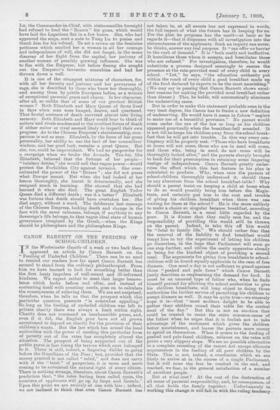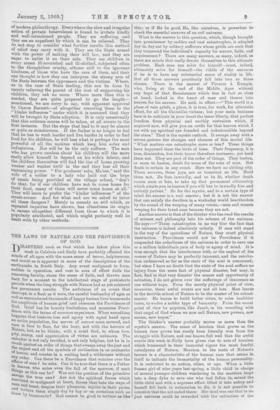CANON BARNETT ON THE FEEDING OF SCHOOL-CHILDREN.
IN the Westminster Gazette of a week or two back there appeared an article by Canon Barnett on the "Feeding of Underfed Children." There can be no need to remind our readers how far apart Canon Barnett has seemed to stand from the ordinary philanthropist. From him we have learned to look for something better than .the first hasty impulses of well-meant and ill-informed kindness. We expect rather to meet that larger benevo- lence which looks before and after, and instead of contenting itself with counting needs, goes on to calculate the consequences of relieving them. We are not surprised, therefore, when he tells us that the prospect which this ,particular question presents "is somewhat appalling." 'So long as the feeding of underfed children was left to private charity there was always a limit within sight. Charity does not command an inexhaustible purse, and, even if it did, the English poor have not all grown accustomed to depend on charity for the provision of their children's wants. But the law which has armed the local authorities with the power of meeting this particular form of poverty out of the rates has completely altered the situation. The prospect of being supported out of the public purse is fast losing the terrors which once belonged to it. There is still, indeed, a lingering dislike to going before the Guardians of the Poor ; but, provided that the money granted is not called "relief," and does not carry with it the "taint" of pauperism, it is more and more .coining to be accounted the natural right of every citizen. There is nothing strange, therefore, about Canon Barnett's prediction that, "the rates having been called upon, the numbers of applicants will go up by leaps and bounds." Upon this point we are entirely at one with him ; indeed, we are inclined to think that even Canon Barnett has not taken in, at all events has not expressed in words, the full import of what the future has in keeping for us. For the plan he proposes has the merit—at least so he regards it—that it dispenses with all investigation into the circumstances of the applicants. Such an inquiry can never, he thinks, answer any real purpose. It "can offer no barrier to the rush of demand." It is "both costly and ineffective. It humiliates those whom it accepts, and humiliates those who are refused." For investigation, therefore, he would substitute a process designed seemingly to ensure the presence at the rate-provided meal of every child in every school. "Let," he says, "the education authority put within the reach of every child a good breakfast made up of the food declared by experts to be the most nourishing." (We may say in passing that Canon Barnett shows excel- lent reasons for making the provided meal breakfast rather than dinner.) This, he holds, will automatically eliminate the undeserving cases.
But in order to make this statement probable even in the very least degree, the Canon has to frame a new definition of undeserving. He would have it mean in future "neglect to make use of a bountiful provision." No parent would come under the eye of the law so long as his children appeared punctually when the breakfast-bell sounded. It is not till he keeps his children away from the school break- fast that he will get into trouble. In this way every con- tingency will be properly met. "Those who have breakfasts at home will not come, those who are in need will come, and those who, being in need, do not come will be thoroughly looked after," and the parents sharply brought to book for their presumption in retaining some lingering vestige of independence. Canon Barnett greatly under- rates the effect which this last feature in his plan is calculated to produce. Why, when once the parents of school-children thoroughly understood it, should there be any absentees from the school breakfast-table ? Why should a parent insist on keeping a child at home when to do so would possibly bring him before the Magis- trate, and certainly put him to the cost and trouble of giving his children breakfast when there was one waiting for them at the school P He is the more unlikely to make a choice so singular because breakfast, according to Canon Barnett, is a meal little regarded by the poor. It is dinner that they really care for, and the responsibility of providing this would still be thrown on the parent. Indeed, to take this off hint would be "fatal to family life." We should rather fear that the removal of the liability to find breakfast would tempt him to try the experiment of letting his children go dinnerless, in the hope that Parliament will soon go one step further, and utilise the costly apparatus already in being for the kindred object of providing a second meal. The arguments for giving free breakfasts to school- children will be found equally applicable to the case of free dinners. One meal a day is not sufficient to guard against those "peaked and pale faces" which Canon Barnett justly describes as emphasising the demand for food. It must be an unusual type of father who, when he finds himself praised for allowing the school authorities to give his children breakfasts, will long object to doing those authorities the further service of permitting his children to accept dinners as well. It may be quite true—we sincerely hope it is—that "most mothers delight to be able to gather their children round their table for the central meal of the day." But this is not an emotion that could be trusted to resist the stern common-sense of the father when he urges that it is foolish not to take advantage of the sentiment which gives the children better nourishment, and leaves the parents mom money to spend on themselves. When it comes to the feeding of peaked and, pale-faced children, reliance on the rates will prove a very slippery slope. We see no possible alternative to a complete recasting of the .recent Act except ultimate acquiescence in the feeding of all poor children by the State. This is not, indeed, a conclusion which we are likely to arrive at in the course of a single Parliament, but it will none the less be reached in the end, and reached, we fear, to the general satisfaction of a number of excellent people. But at what cost? At the cost of the destruction of all sense of parental responsibility, and, by consequence, of . all that holds the family together. Unfortunately in working this change it will fall in with the ruling tendency of modern philanthropy. Everywhere the slow and irregular action of private benevolence is found to irritate kindly and well-intentioned people. They see suffering, and they see an expedient by which it can be relieved. They do not stop to consider what further results this method of relief may carry with it. They see the State armed with the pow,er of making their will law, and they are eager to enlist it on their aide. They see children in every street ill-nourished and ill-clothed, subjected often to the thoughtless cruelty, oftener still to the ignorant kindness, of those who have the care of them, and, their one thought is how they can interpose the strong arm of the State between the oppressors and the victims. Where, as in the case of State feeding, this can be done by merely relieving the parent of the cost of supporting his children, they ask no more. Where more than this is needed, they are quite prepared to go the length— mentioned, we are sorry to say, with apparent approval by Canon Barnett—of altogether removing them to the "kinder influences" under which it is assumed that they will be brought by State adoption. It is only occasionally that this extreme course will be taken, at all events in the first instance. But the steps that lead to it may be almost or quite as mischievous. If the father is no longer to feel that he has to work harder and live harder in order to find food for his children, he will lose what is perhaps the most powerful of all the motives which keep him sober and industrious. Nor will he be the only sufferer. The man who has grown careless about his children will the more easily allow himself to depend on his wife's labour, and the children themselves will find the ties of home growing weaker and weaker until in the end they lose all their restraining power. "For goodness' sake, Ma'am," said the wife of a collier to a lady who held out the hope of meals being provided at the village school, "don't do that, for if our children have not to coins home for their food, many of them will never come home at 'all." They will learn to prefer the "kinder influences of the street-corner. And for what end are we asked to incur all these dangers ? Merely to remedy an evil which, as repeated inquiries have shown, has oftentimes its origin in causes altogether different from those to which it is popularly attributed, and which might perfectly well be dealt with by other methods.













































 Previous page
Previous page